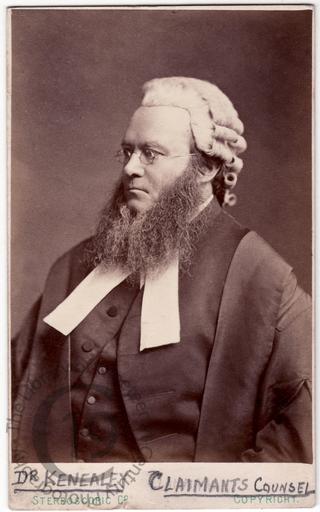
Edward Vaughan Kenealy
A carte-de-visite portrait of the Irish barrister and writer Edward Vaughan Kenealy (1819-1880), who acted for the Claimant in the famous Tichborne Claimant trial and was eventually disbarred.
Born in Cork, the son of a local merchant, he was educated at Trinity College Dublin; he was called to the Irish bar in 1840 and to the English bar in 1847. He took silk in 1868.
He obtained a fair practice in criminal cases, the most famous of which included the unsuccessful defence (as junior counsel) of the poisoner William Palmer (1856); the defence of Richard O’Sullivan Burke and his accomplice Casey during the Fenian Rising (1867); and the prosecution of the directors of Overend, Gurney and Co. for fraud following the company’s collapse (1869). He is best remembered, however, as counsel for the Tichborne claimant and for his eccentric and disturbed conduct of the trial, behaviour which eventually led to his his ruin. During the trial, Kenealy abused witnesses, made scurilous allegations against various Roman Catholic institutions, disrespected the judges and protracted the trial to the longest in English legal history. His violent conduct of the case became a public scandal and, after rejecting his client's claim, the jury censured his behaviour.
Kenealy suffered from diabetes and his erratic temperament has sometimes been attributed to poor control of the symptoms. He started a newspaper, The Englishman, to plead his cause, and to attack the judges. His behaviour was so extreme that in 1874 he was disbenched and disbarred by his Inn.
At a by-election, he was elected to parliament for Stoke-upon-Trent with a majority of 2000 votes. However, since no other member of parliament would introduce him when he took his seat, Disraeli forced a motion to dispense with this convention.
In Parliament, Kenealy called for a Royal Commission into his conduct in the Tichborne case, but lost a vote on this by 433-3. During this period, he also wrote a nine-volume account of the case. Dr Kenealy, as he was always called, gradually ceased to attract attention, lost his seat at the 1880 UK general election and died in London later in the year.
Photographed by the London Stereoscopic and Photographic Company.
Code: 123947




